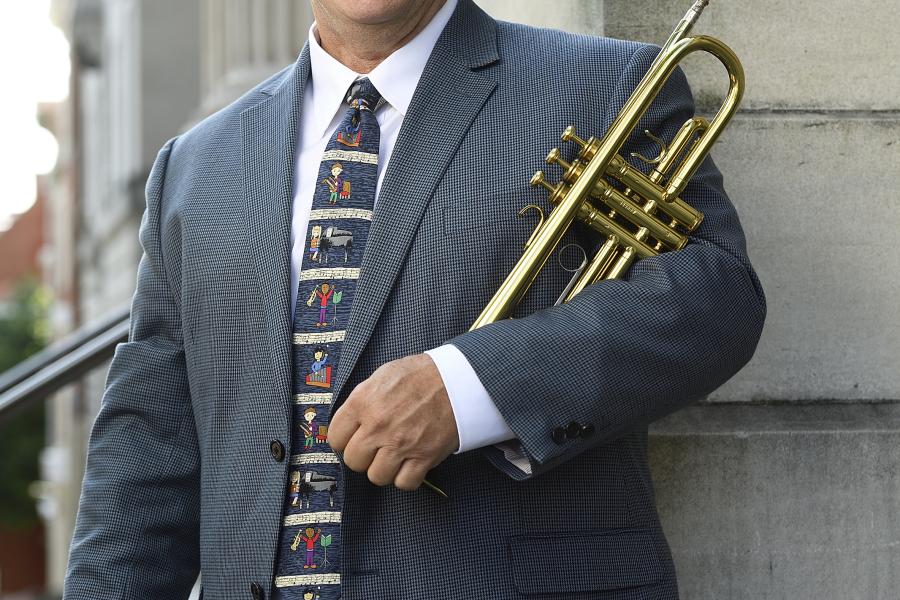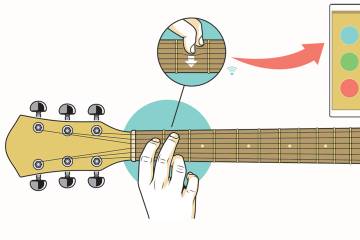Sitting at his dinner table in the banquet hall of a conference facility on the coast of South Africa on the first night of an academic conference in 2017, Kris Chesky was surprised to hear the welcome speaker announce that the night's program would include a performance by none other than trumpet player Kris Chesky.
Of course, his trumpet is never far away, so after an initial moment of shock, wondering if he had heard correctly, Chesky ran to grab it from his hotel room and made it back to the now only dimly lit hall just in time to be welcomed onto the stage by the speaker. On his way to the microphone, Chesky introduced himself to the band that had appeared on stage—and who were, up to this point, complete strangers to Chesky.
"I didn't know the tunes they were playing, but these musicians had a really intense groove," Chesky says. "I told them to just keep playing and not worry about me, and then I played my jazz over what they were playing. It was so much fun. In the end, we were the last ones to leave this banquet hall. We played all night long."
Chesky says that to him, research is a lot like jazz music.
"I'm not a drummer," says Chesky. "I'm not a piano player. I'm not a bass player. I'm a trumpet player. But when I got up on that stage, with each one of those musicians, there was a collective understanding, and a certain level of ability to work together in this space, that allowed us to do that without any preconceived idea of what we were going to do, and how we were going to do it, because that's what we were trained to do.
"I'm not a physicist. I'm not an engineer. But as a researcher, if I have the fundamental understanding of rationale building, literature review, methods, and ways of looking at things from different disciplinary standpoints. Just like any other researcher from any other discipline, with this fundamental skill set, I can cross disciplinary boundaries and work with experts from other fields. And then we encourage this in our students and train future cross-disciplinary researchers. You have to get the engineering students and the music students together, just like you have to get the drummer and the bass players together."
Chesky is bringing his talents—as a musician, a researcher, and a teacher—to Johns Hopkins University as a Bloomberg Distinguished Professor of Performing Arts Health. He will hold primary appointments in the Peabody Conservatory and in the Department of Physical Medicine and Rehabilitation in the School of Medicine.
Chesky, a leading researcher of performing arts health, investigates issues at the intersection of music and health, advocating for health policy and safety standards for music students and performing artists, as well as increased specialized training for music educators to integrate research and clinical care for performing artists into education.
"I played music all throughout my time in school and college, and nobody ever introduced me to the idea that my occupation had any kind of occupational health risks associated with it," Chesky explains. "My thumbs don't quite stretch back as far as they used to, and I have problems with my neck, and that's from holding a trumpet a certain way all these years. All musicians have these kinds of issues. In tertiary education, we're not preparing musicians for the realities of a career in music or setting them up with the necessary competencies to encourage doing music in a way that's less likely to lead to health problems, and we're not training educators to teach students how to do that."
Chesky's groundbreaking research and advocacy has led to unprecedented health and safety accreditation standards for all schools of music accredited by the National Association of Schools of Music. His work also prompted the Texas Education Agency to mandate all public school band, choir, and orchestra teachers across the state of Texas to meet learning objectives regarding physical, auditory, and vocal health. He has co-authored crucial advisory materials to assist schools with implementation of these standards.
Chesky says that music teachers play a decisive role in mitigating the risk of music students, particularly with regard to sound exposure.
"We know that the actual musical activity is the basis for many of the health problems musicians face," Chesky says. "Therefore, we have to focus on how we do what we do, and how do we teach what we teach. When we measured sound exposure during ensemble-based instructional activities, such as orchestra or jazz band, we could see how exposure levels changed over time, between groups, with different teachers. There is no question about it: We can directly trace exposure level back to the pedagogy or the conducting skill of the teacher. So it's incredibly important that we have standards for how to train these educators to most effectively mitigate the risk to music student's health."
Chesky's work has also resulted in the development of specialized equipment to mitigate the occupational risks of making music. For instance, he developed sensors for assessing trumpet mouthpiece forces against the lips and the biomechanical forces generated against the right thumb of clarinetists.
He has evaluated ear-plugs promoted for musician use, and found that they are not sufficient when used by musicians.
"Applying industrial audiology standards to music doesn't really work—the frequencies measured, how they're measured, and the role of the employee's behavior in the generation of risk are all different in music than in a factory setting," Chesky explains. "The basis for evaluating these earplugs was never intended to be used to evaluate protection from musical sounds."
Chesky developed a new testing protocol using an artificial head with a simulated ear to measure more frequency points within the range of human hearing than are typically tested, and using real music, more accurately representing all of the frequencies a musician is exposed to. Chesky discovered that many of these plugs distort the sound and do not lower it equally across all frequencies in the way marketing materials suggest, and therefore are not adequate protection for musicians.
Chesky has also conducted research on the therapeutic potential of music, including investigating pain-reducing effects of music vibration on rheumatoid arthritis patients, and music-based pre-emptive analgesia—or pain relief—protocols for post-operative pain reduction among young adolescents undergoing spinal fusion surgery.
"Recognized as a leader in performing arts medicine and performance science, Kris Chesky is the ideal candidate for the Peabody Conservatory's first Bloomberg Distinguished Professorship," says Fred Bronstein, dean of the Peabody Institute. "He thrives on interdisciplinary collaboration and has an outstanding track record of inspiring and equipping emerging researchers in performing arts health. As chair of a new Department of Performing Arts and Health at Peabody, in collaboration with colleagues at JHU Medicine, Dr. Chesky will open new pathways with immense potential to advance our industry-leading arts and health collaborations and reduce the prevalence and impact of injury for performing artists everywhere."
Chesky comes to JHU from the University of North Texas, where he was a professor in the College of Music. Chesky also founded and served as co-director of the Texas Center for Performing Arts Health. Chesky says this move to Johns Hopkins is important not just for his own research, but also for the music discipline as a whole.
"The fact that Johns Hopkins, as a premier research institution with a prestigious conservatory, is embracing these challenges in performing arts health speaks loudly in and of itself and will resonate broadly, and definitely has the potential to impact the disciplines of music and dance," Chesky says. "And then, the structure of the BDP program with its intention to work across disciplines, without the roadblocks often inherent in university structures, brings about collaborations with engineering, audiology, medicine, and more. This is an incredible opportunity to innovate, to grow, and to lead."
Chesky earned his Bachelor of Music in Music Performance from Berklee College of Music and his Master of Music Education with a jazz emphasis and his PhD in Music Education/Research from the University of North Texas. He completed postdoctoral research at the Human Performance Institute at the University of Texas at Arlington, the Long School of Medicine at the University of Texas at San Antonio, and Cook Children's Medical Center before joining the faculty at the University of North Texas.
"What a welcome addition to Johns Hopkins Dr. Chesky is," says Theodore DeWeese, interim dean of the School of Medicine. "His research of music's ability to offer pain relief drew much attention and served as a bedrock in the field of music therapy. And Dr. Chesky's work and advocacy around occupational safety for musicians has brought much-needed attention and change to the world of music performance. His work embodies the spirit of the Bloomberg Distinguished Professorships program."
Chesky has been a musician for most of his life, and it propelled him through school and into a career. Coming from a very musical family, Chesky began receiving trumpet lessons in third grade from his uncle Chet. Over the years, he began playing more and more at campaign events for his politically active family in Western Massachusetts, and eventually put himself through college playing in polka bands, rock bands, jazz bands, Elvis Presley impersonating bands, and wedding bands, to name a few. For Chesky, the reason behind it all was simple: "It wasn't because of much more than I just love to do it."
Chesky is inspired by seeing this passion—for the music and the research—in his students.
"I absolutely love teaching young people," Chesky says. "Seeing a young musician who has been so invested in practicing their instrument discover this different way of thinking and really flourish in a research project—that's the joy. Similarly, many non-music majors, especially those with backgrounds in music, also shine when they are provided the chance to do the same, but through the lens of their chosen discipline. Creating opportunities for these student groups to work together to facilitate research is the ultimate ambition."
Said Stephen Gange, interim provost at Johns Hopkins University: "Kris Chesky's research on the occupational risks of the performing arts is deeply informed by his decades of experience as a musician. He has incorporated this unique insight into an interdisciplinary line of scientific inquiry that will lead to new ways of addressing and preventing music and performance injury. We are eager to watch as he develops and strengthens collaborations between two JHU nationally-recognized divisions: the Peabody Institute and the School of Medicine."
As a Bloomberg Distinguished Professor, Chesky joins an interdisciplinary cohort of scholars working to address major global challenges and teach the next generation. The program is backed by a gift from Michael R. Bloomberg, a Johns Hopkins alumnus, founder of Bloomberg LP and Bloomberg Philanthropies, World Health Organization Global Ambassador for Noncommunicable Diseases, United Nations Secretary-General's Special Envoy for Climate Ambition and Solutions, and 108th mayor of New York City.









